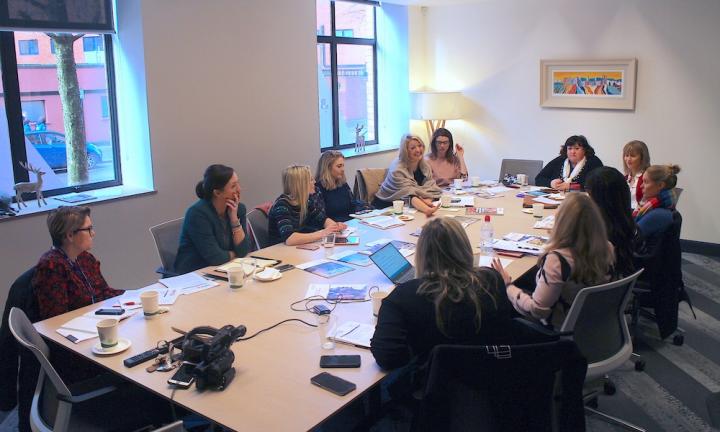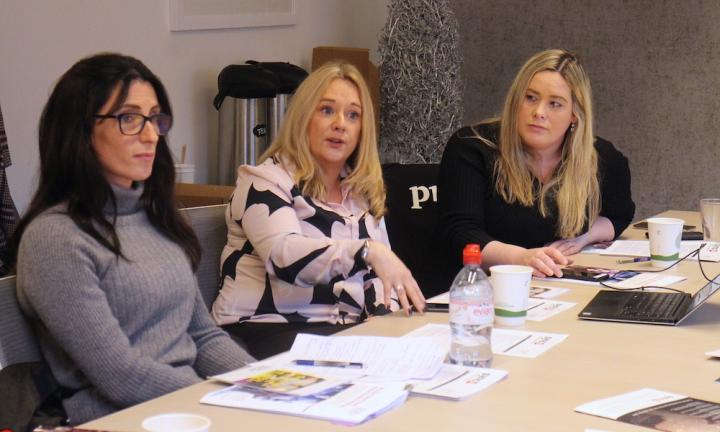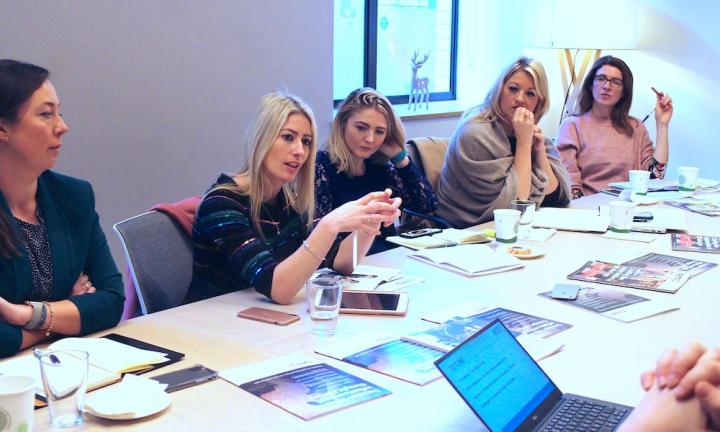
Female figures from some of Northern Ireland’s most prolific tech companies and academic institutions gathered to discuss this pressing question.
CCEA (the Council for the Curriculum, Examinations & Assessment) recently released a report entitled ‘Why Don’t More Young Women Study Computing?’
This research served as a catalyst for a roundtable event here at Sync NI, where we gathered 11 female figures from Northern Ireland’s most prolific tech companies and academic institutions to discuss the wider question of why more young women don’t go into STEM careers.

CCEA’s Pamela Larmour kicked off the roundtable event with a breakdown of the recent CCEA report. As the head of research and statistics at CCEA, Pamela’s role is to provide high calibre research and statistical investigations in education. Her team is responsible for analysing GCE and GCSE results every year and highlighting and monitoring any trends, and the recent report was a direct result of their monitoring efforts. CCEA Research is used to support and inform management and to provide valuable evidence to inform practice and improve CCEA services to schools.
“The gender balance in students studying computing subjects has been the same for the last 20 years,” Pamela explained. “The report investigates some reasons why this gender divide may be present but it doesn’t offer the solution, just some issues we feel need recognised. The intention of the report is to provoke discussions on how people view computing, but also how they view young females at school and what their career choices are.”
“Qualifications are gender neutral. They are designed and written to make sure there is no bias towards anybody in any way. There are always slight differences in the number of males and females taking subjects, for example maths and double-award science, but there is nothing as stark as the numbers in computing.“
“Specifications are reviewed every five years and new specifications developed if there is a need. CCEA developed new computing A-levels of Software Systems Development (SSD) and Digital Technology. Digital Technology is also available at GCSE. The new qualifications were developed as accessible for all, yet the figures going forward from 2015 still show in a drop in females taking them.”
“Girls outperform boys at school in most subjects. However, research shows that females are less confident in their ability with computers than males,” Pamela explained.

One of the examples cited in CCEA’s report is of a computing undergraduate who felt she had lower computing skills than somebody who wasn’t even doing that degree. Pamela added: “The last thing we want to do with this report is to encourage that view, because it is clear that girls are very high achievers in these subjects. It is bizarre that girls would rate themselves lower in comparison with boys. The research suggests that computer anxiety then can be influenced by classroom culture, home culture, popular culture and career prospects.”
“In the report we mention that there is a stereotype of what a computer scientist looks like. It’s not what all girls or parents feel, but there is a stereotype and because that exists, a lot of girls don’t want to display the behaviour of that stereotype. So, maybe they find it easier to just step aside and not do the subject.”
“Our responsibility is to make sure that we offer students a broad range of interesting and useful GCSEs and A-levels. In the case of subjects were there is a gender imbalance we need to try to understand why there is a difference and if possible change it. In the case of computing it would seem that the environment and culture around females and computing needs to change. So that is why I have come here today to discuss the issues identified in our report and ask ‘Is there anything you can do to help with this issue?’ ”
Diane Morrow is co-founder of mTech. Academy, a group focused on helping young people think about the skills and opportunities available to them through problem-based and experiential learning within the classroom. Having previously taught careers and business studies for 10 years, Diane works very closely with middle leaders and principals in schools. She’s found that what employers want may not match up with today’s narrow software development qualifications.

“We worked with 16 schools this year and 10 schools last year. When we bring them out to industry leader CEOs, they say, ‘Yes, do SSD (Software Systems Development), it’s brilliant. It does show that there's a higher level of retention in university. But at the end of the day, we want math students, people who can write properly, and problem solvers.’”
“When we look at some research coming out of Harvard, they're saying that humanities and liberal arts are completely being ignored,” explained Diane. “If we think about what technology is doing, and we think about the need for that human skill set, you're getting that from other subject areas as opposed to going narrow with SSD. What would be really interesting is to look at how many people actually enter the tech sectors and what backgrounds they come from, because when we look at AI and cyber-security, those workers don’t come from pure coding backgrounds.”
Narelle Height is the education outreach manager at PwC NI. She comes from a computing background and has taught students of all ages, including lecturing at university level. She doesn’t think girls often realise the creativity coding can bring, and it could be partly due to how it’s presented in schools.
“You can train your brain to think in different ways and come up with innovative solutions, but it’s getting that message across,” she explained. “At primary school it’s so interactive, visual and appealing. Then they get into the C2K environment, to learn the Python course, which is so uninspiring. Teachers don’t have the knowledge and understanding to actually be able to take it outside to the playground, draw a grid and show them through kinesthetic learning.”
Samantha Kirk is the VP of engineering and site lead for tech company Dynamic Signal, a Silicon Valley based business that provides a platform to help employers communicate and engage with their workforce. Its centre of excellence was set up in Belfast in January 2019 and Sam has spent the year recruiting and building the team while maintaining gender balance.

Sam reiterated Narelle’s view on increasing the creativity and appeal of problemsolving:
“I think too often the technical problems that we use in schools are boring; they don’t inspire and attract people. Students do them because they have to, not because they are interesting, and it’s not a real reflection of what we do in the industry day-to-day.
“We want students to understand the sorts of challenges we work on day to day in our organisations– how digital transformation works in the real world and the fantastic impact that it has. It changes people’s lives! That’s how we start getting them excited. Ultimately, what we do is ‘shiny and exciting’ but I don’t think students are given sight of that.”
Susan McCambridge is an Economic Development Manager at Belfast Metropolitan College. Through the Bring IT On programme funded by the Department for the Economy, Belfast Met run a number of school presentations that help with “repositioning IT and technology around social good”. They use the Red Cross charity as an example of where technology can be used to solve real world problems, and hope that an emphasis on using technology for social good will encourage more young people to consider a career in tech.
Narelle added that from a lecturing point of view, when in university she had a cohort of 400: “It’s really hard to find the time to do invigorating lectures and live coding while trying to manage retention for that many people. So it’s worthwhile taking that into consideration when addressing new challenges to females in STEM.”
Pauline Keys is a senior manager in software development at digital marketing company BazaarVoice, originally working in Java software engineering for many years before moving up into leadership roles. Pauline admitted that she almost didn’t make it through university and struggled a lot with the coding element of her career at the beginning:
“I was very close to dropping out of software engineering at university at the end of second year,” she said. They were teaching the basics of coding and I could just about gather it, but I was constantly just keeping my head above water. I was fortunate enough to do a really good placement year and when I got out into the industry, I realised that yes I could code and hold my own, but I could do so many other things. I can take control and be organised, and have good communication skills as well. That’s where I realised my strengths are.”
Pauline recalls selecting Computer Science by chance: “I remember we had a careers day in high school and a friend’s sister was hosting a stand on her own. Everybody else was busy so I went over and asked what she did, which was Computer Science at [Ulster University] Jordanstown. She described to me what a software engineer did and it ended up in this one hour conversation about problem solving. So I picked it by pure accident.”
Sam Kirk said her path was also down to sheer chance for the most part: “I didn’t know what I wanted to do and my mum suggested computer science so I gave it a go. I hated the first year as it was mainly coding which I wasn’t good at it, but I was too stubborn to drop it. I had to work really hard at it. I remember when I was applying for placements that I was worried I wouldn’t get a job, but I got a really good placement and had a great female manager who became my mentor at the time.”
It was this practical experience and not the actual lectures that really engaged Sam and pushed her to finish uni and get a first in her degree: “The journey itself was hard. I love what I do now and am good at it, but the journey to get there wasn’t overly enjoyable. I stuck it out because I was stubborn, but how many people didn’t? How many great people did we lose along the way?”
Roisin Finnegan is a senior manager at Deloitte Ventures NI and is particularly focused on innovation and entrepreneurship. Her team focuses on external ventures such as start-ups that they can collaborate with and invest in, internal ventures and engagement, and also education around innovation. Discussing Pauline and Sam’s career pathways, Roisin added:
“I think that both of your testimonials show that too much is left to chance; there are chance conversations and a strong female mentor. It should have been made apparent to you when you were making career or university choices that software engineering is a viable choice. I think those issues still exist now many years later; females in particular don’t know about their choices. There’s an education point that needs to be made to these young females about problem-based learning: it’s not just stereotypical of computer engineers to be sitting alone in quiet, darkened corners, you have so many choices.”
Camilla Long is the director of Bespoke Communications, a leading people development agency and she is a computer scientist by trade. She initiated the CareerEncode.com programme that helps employers recruit and retain top digital apprenticeship talent, and emphasised the importance of making the journey for young girls into STEM easier and better.
Camilla makes it her business to meet young people and ask them what they’re interested in, and notes that girls don’t see themselves in tech jobs. From a recent experience at a Skills NI event for schools, Camilla said that 95% of the Year 10 schoolgirls she spoke to expressed their preference in pursuing careers in Health and Social Care. By contrast, the boys wanted to do “agriculture, engineering, tech, accountancy; they wanted to do everything.” So, Camilla asked, “At the age of 14, why is there that cultural socialisation that feeds into that lack of awareness?”
This article first appeared in the Women in Tech special edition of the Sync NI magazine. You can download a FREE copy here.